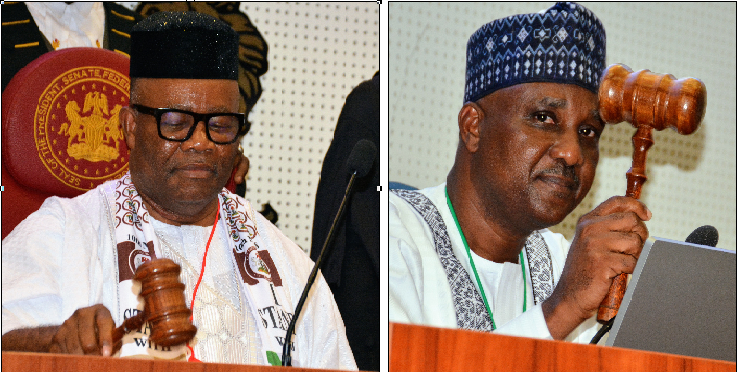The recent conferment of national honours by President Bola Tinubu on Nigeria’s Independence Day has reignited discussions about the hierarchy within the country’s National Assembly and the overall effectiveness of its bicameral legislature. On October 1, during the modest celebration of Nigeria’s 64th independence, President Tinubu awarded honours to prominent political figures, including the Speaker of the House of Representatives, Tajudeen Abbas, and the Senate President, Godswill Akpabio. While these awards aimed to recognize their contributions, political analysts viewed the lower honours given to the House officials as indicative of a broader underlying dissatisfaction and misrepresentation of the House of Representatives, often seen as inferior to the Senate in Nigeria’s political discourse.
Members of the House of Representatives voiced their discontent over the perceived ‘demeaning’ honours during a recent plenary. Representatives argued that the classification of the Senate as the ‘upper chamber’ and the House as the ‘lower chamber’ contributed to a culture of discrimination against the legislative arm of government that the House represents. Deputy spokesperson Philip Agbese emphasized this misrepresentation, indicating that the Senate’s designation as ‘Chairman of the National Assembly’ further perpetuates a hierarchy that is not constitutionally recognized. Consequently, the House members adopted a motion to assert their equal standing with the Senate while also pushing for an amendment to the National Honours Act to address the issue of perception and honour.
In response to the mounting concerns, the presidency clarified that the honours were awarded based on established precedents rather than subjective criteria. The Special Adviser on Senate Matters, Senator Basheer Lado, highlighted the historical context of the awards, noting that past leaders from both chambers have received varying honours over time. To allay the concerns raised by the House, President Tinubu elevated Speaker Abbas’s honour from CFR (Commander of the Order of the Federal Republic) to GCON (Grand Commander of the Order of the Niger) in a move interpreted as an attempt to rectify the perceived historical oversight and restore balance between the two chambers.
Discussions of national honours soon led to an examination of the National Honours Act, which governs the awarding of titles and honours in Nigeria. This act delineates the roles of the President in bestowing honours based on specific ranks within the two orders of dignity—GCFR for the President and GCON for select high-ranking officials. Observers highlighted that while the GCON is the second highest honour, it is mainly reserved for notable citizens in public and private life. Comparatively, CFR and CON are presented as lower ranks but still bestow significant recognition upon awardees. This structure of national honours reflects a long-standing tradition in Nigeria, where political influence often correlates with the level of honour bestowed.
The ongoing friction between the two legislative chambers has provoked calls for restructuring, with some analysts advocating for a unicameral legislature to combat perceived inefficiencies and costs. Critics have pointed to the hefty salaries and allowances disbursed to members of the National Assembly and the high costs associated with maintaining a bicameral system in contrast to a more streamlined legislative structure. The Revenue Mobilisation Allocation and Fiscal Commission’s reports highlight the exorbitant expenditures and allowances, emphasizing the financial burdens that the current legislative structure places on the country, resulting in ongoing debates surrounding its viability.
Political scientists and scholars contributing to the discourse have expressed diverging views regarding the perceived hierarchy between the Senate and the House of Representatives. Some, like Professor Oni Abiodun, contend that the honours reflect a superiority of the Senate over the House, suggesting a comprehensive overhaul of the legislative structure in favour of a unicameral system. Other academics, including Professor Ameachi Egboh, argue that both legislative chambers serve unique and essential functions that must not be undervalued. Egboh asserts that, constitutionally, both bodies are co-equal, emphasizing the House’s role in representing the public more closely, while also acknowledging the Senate’s place in federal resources and appointments.
Ultimately, the controversy surrounding the national honours and the subsequent debate illuminates the deeper tensions within Nigeria’s governance framework. Voices for reform intensify as discussions about hierarchy and representation take center stage, hinting at a potential reevaluation of how political power and recognition are allocated within the country. As Nigeria navigates its complex political landscape, the resolution of these issues could significantly influence the future of its democracy, impacting how the nation perceives and values governance at all levels.














